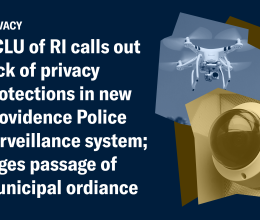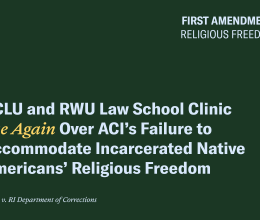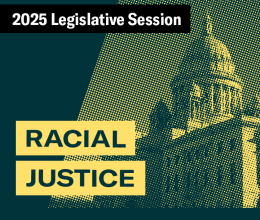The ACLU of Rhode Island has filed a “friend of the court” brief addressing the issue whether the civil commitment hearing of convicted sex offender Todd McElroy should be public. In this highly publicized case, the Governor and Attorney General took steps to invoke the mental health civil commitment process just weeks before McElroy’s 17-year prison sentence was scheduled to end. The ACLU and a number of medical groups have been very critical of the state’s efforts in that regard.
In recognition of the competing civil liberties issues involved on the issue of whether the proceedings should be public, the ACLU’s brief, filed in R.I. District Court, first argues that the proceedings should be open at least in part “because of the quasi-criminal nature of Mr. McElroy’s detention and the furtherance of the public policy goal of fostering public trust in the judicial process.” At the same time, the brief argues that McElroy’s “right to privacy in his healthcare services and information is protected by law and should not be forfeited by notoriety or past criminal behavior.” The brief, filed by RI ACLU volunteer attorney Katherine Powell, asks the Court to “fashion a remedy to accommodate the two competing interests.”
Citing the timing and use of the mental health law against McElroy shortly before his release from prison, the brief argues that the “the fact that the State is pursuing his involuntary commitment through a civil process does little to dispel the perception that Mr. McElroy is being detained because of his alleged criminal propensity.” The brief argues that the “questionable use” of the mental health law in this case “compels the need for this particular hearing process to be open and transparent.”
At the same time, the brief notes that by a commitment hearing’s very nature, “confidential healthcare information plays a crucial role in the court’s process,” and that since it is an involuntary process, “the individual’s confidential healthcare information is placed at issue without his or her consent or waiver.” Noting that the General Assembly has enacted strict laws to protect the privacy of mental health information, the brief argues it would be “illogical” to conclude that legislators “frustrated their own intentions by allowing public disclosure of that information through the very judicial process they devised to implement” the law.
The brief concludes by calling on the court to “fashion a remedy which allows for an open court process that provides a public ruling on the merits of the civil commitment proceeding itself, including its reasoning and adherence to the civil nature of its intent, while protecting the confidential healthcare information disclosed” during those proceedings.







